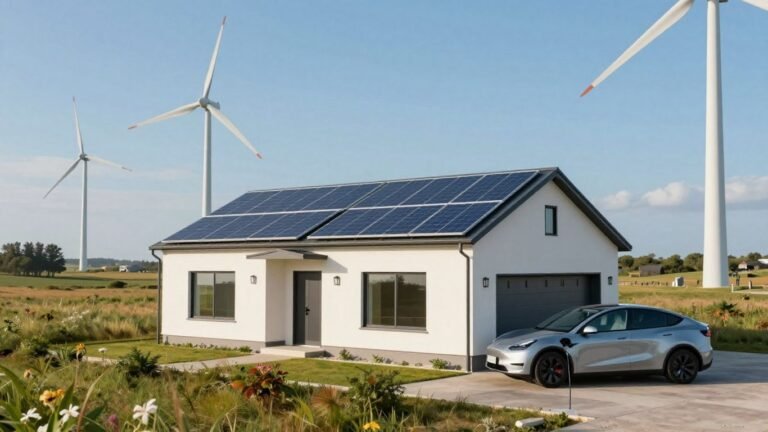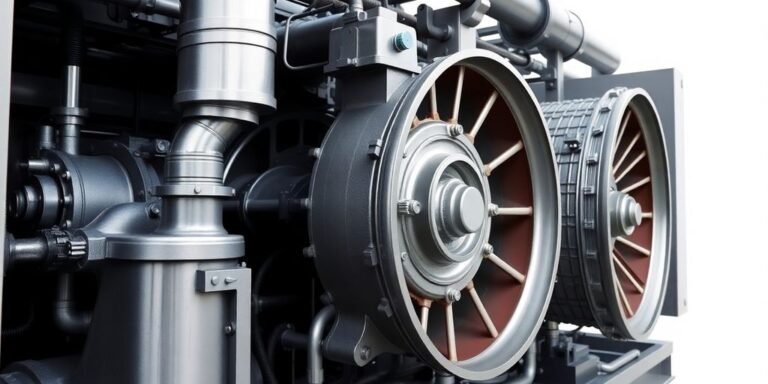Generator at Home Depot: Finding the Best for Power Outages
Picking out a generator at Home Depot can feel like a big deal, especially with all the options out there. You want something that just works when you need it, whether it’s for a power outage or just for some outdoor fun. This article is all about helping you figure out what kind of generator makes the most sense for your home, so you can feel good about your choice.
Key Takeaways Generator at Home Depot
- Think about what you’ll use the generator for before you buy.
- Match the generator’s power to your home’s needs.
- Consider the different fuel types and what works best for you.
- Look for features like low noise and good safety ratings.
- Home Depot has services like rentals and installation to help you out.

Understanding Generator Types At Home Depot
When you’re trying to figure out which generator is right for you, Home Depot offers a few main types. Each one has its own strengths, so it really depends on what you need it for. Let’s break down the options.
Portable Generators For Versatile Use
Portable generators are probably what most people think of when they picture a generator. They’re great because you can move them around easily. Need power for a job site? Camping? A temporary outage? These are your go-to. They usually run on gasoline, but some can use propane too. The downside is they’re not automatic – you have to start them up yourself. They also tend to be a bit louder than other types.
Standby Generators For Home Backup
Standby generators are the big guns for home backup. These are permanently installed outside your house and connect directly to your electrical system. When the power goes out, they kick on automatically. No fuss, no muss. They typically run on natural gas or propane. Think of them as a whole-house solution, keeping your lights, fridge, and even AC running. Of course, they’re a bigger investment upfront, and you’ll need a professional to install them. But the peace of mind during a storm? Priceless.
Inverter Generators For Sensitive Electronics
Inverter generators are the quiet, tech-savvy cousins of portable generators. They produce cleaner power, which means they’re safe for sensitive electronics like laptops, smartphones, and TVs. They’re also usually lighter and more fuel-efficient than traditional portable generators. They’re perfect for camping, tailgating, or any situation where you need reliable power without a lot of noise. They might not be powerful enough to run your whole house, but for smaller needs, they’re a great choice.
Choosing the right generator really comes down to understanding your specific needs. Think about what you want to power, how often you’ll use it, and where you’ll be using it. Home Depot has a range of options, so taking the time to figure out what’s important to you will help you make the best decision.
Determining Your Power Needs
Choosing a generator isn’t just about picking one off the shelf at Home Depot; it’s about making sure it can actually handle what you need it to do. I remember when my neighbor bought a generator that was way too small. He ended up only being able to power his fridge and a lamp! So, let’s figure out how to avoid that.
Calculating Essential Appliance Wattage
First things first, you need to figure out how much power your stuff actually uses. This means making a list of everything you want to run during a power outage. Go around your house and write down the wattage listed on each appliance. Don’t forget things like your refrigerator, lights, and any medical equipment. If it has a motor, like a fridge or a window AC unit, it’ll have a starting wattage that’s higher than its running wattage.
This is the surge of power it needs to kick on. A good rule of thumb is to triple the running wattage to estimate the starting wattage. For example, if your fridge uses 200 watts running, it might need 600 watts to start. Add up all the running wattages, then add the highest starting wattage from any single appliance. That’s your total wattage requirement.
Matching Generator Size To Your Requirements
Okay, so you’ve got your total wattage number. Now what? You want to get a generator that can handle that, plus a little extra. It’s better to have too much power than not enough. Generators shouldn’t be run at their maximum capacity for long periods, so aim for a generator that provides at least 10% more power than you calculated. For example, if you need 5000 watts, look for a generator that puts out at least 5500 watts. This gives you some headroom and helps extend the life of the generator. If you’re looking for a 50 amp generator, make sure it aligns with your calculated power needs to avoid overloading.
Considering Future Power Demands
Think about what you might want to power in the future. Are you planning on adding a window AC unit? Maybe a bigger fridge? It’s a good idea to factor in some extra capacity for future needs. It’s way easier to buy a slightly bigger generator now than to have to upgrade later. Also, consider seasonal needs. In the summer, you might need to run air conditioners, while in the winter, you might need to power space heaters. Planning ahead will save you headaches down the road.
It’s also worth considering renting a generator from Home Depot before buying. This lets you test out different sizes and see what works best for your needs without committing to a purchase. Plus, it gives you a chance to figure out if you really need that much power or if you can get by with less.
Fuel Sources For Your Generator

Choosing the right fuel source is a big deal when you’re picking out a generator. You gotta think about what’s easy to get, how much it costs, and how you’re planning to use the generator. Let’s break down the common options.
Gasoline Powered Generators
Gasoline is probably the most common fuel for portable generators. It’s easy to find at pretty much any gas station, and it’s relatively cheap. The downside? Gasoline doesn’t store well long-term. If you’re not using your generator regularly, you’ll need to add a fuel stabilizer to keep the gas from going bad. Also, gasoline generators should only be used outdoors because they produce carbon monoxide.
Here’s a quick rundown:
- Pros: Readily available, affordable.
- Cons: Short storage life, produces carbon monoxide.
- Best for: Occasional use, portable generators.
Propane And Dual Fuel Options
Propane (LPG) is another popular choice, especially for people who want a longer-lasting fuel source. LPG can be stored for years without going bad, which is a huge plus. Some generators are even dual-fuel, meaning they can run on either gasoline or propane. This gives you flexibility, but propane might be a bit more expensive than gasoline in some areas.
- Pros: Long storage life, cleaner burning than gasoline, dual-fuel options available.
- Cons: Can be more expensive than gasoline, requires a propane tank.
- Best for: Emergency backup, long-term storage, versatile use.
Diesel Generators For Heavy Duty Use
Diesel generators are the workhorses of the generator world. They’re super efficient and can run for long periods of time without needing a refill. Diesel fuel also has a longer shelf life than gasoline, though not as long as propane. The downside is that diesel generators tend to be louder and more expensive than gasoline or propane models. They’re also heavier, so they’re not as portable. Diesel generators perform best when used for big jobs over long periods of time.
Diesel generators are often used in commercial settings or as standby generators for homes because of their reliability and efficiency. They’re a solid choice if you need a generator that can handle heavy loads and run for extended periods.
- Pros: Highly efficient, long run times, durable.
- Cons: More expensive, louder, heavier.
- Best for: Heavy-duty use, commercial applications, standby power.
Key Features To Look For In A Generator
Noise Levels And Quiet Generators
Nobody wants a generator that sounds like a jet engine taking off. Noise levels are a big deal, especially if you’re using it in a residential area or camping. Look for generators with a decibel rating (dB) that suits your needs. Generally, anything under 60 dB is considered quiet. Some models even have special mufflers or enclosures to reduce noise further. Consider where you’ll be using the generator and how much noise you (and your neighbors) can tolerate.
Safety Features And EPA Compliance
Safety first, always! Make sure the generator you choose has essential safety features like:
- Carbon Monoxide (CO) Detection: This is non-negotiable. CO is a silent killer, and a detector will shut down the generator if dangerous levels are detected.
- Low-Oil Shutdown: Protects the engine from damage by automatically turning off the generator when oil levels are too low.
- Overload Protection: Prevents damage to the generator and connected devices by shutting down if the load exceeds the generator’s capacity.
Also, check for EPA compliance. This ensures the generator meets emissions standards, which is good for the environment and sometimes required by local regulations. You can find a Westinghouse WGen20000c that meets these requirements.
Ease Of Use And Maintenance
Let’s be real, nobody wants a generator that’s a pain to start or maintain. Look for features that make life easier:
- Electric Start: Push-button starting is way easier than pull-starting, especially in cold weather.
- Clear Control Panel: Easy-to-read gauges and controls make operation straightforward.
- Easy Access for Maintenance: Check that oil changes, filter replacements, and spark plug access are simple. A generator with these features will make generator maintenance much easier.
A generator is an investment, so choosing one with user-friendly features and straightforward maintenance will save you headaches down the road. Regular maintenance is key to keeping your generator running smoothly for years to come.
Home Depot Services For Generators

Home Depot isn’t just about selling generators; they also provide a bunch of services to make the whole process easier. From figuring out what you need to getting it all set up, they’ve got options to help.
Generator Rental Options
Sometimes, buying a generator just doesn’t make sense. Maybe you only need one for a short-term project, or you want to try one out before committing to a purchase. That’s where generator rental comes in handy. Home Depot lets you rent a generator, which can be a really cost-effective solution for temporary power needs. It’s also a good way to test different models to see what works best for you without the full investment.
Professional Generator Installation
Okay, so you’ve bought a generator, but now what? Installing a generator, especially a standby one, can be tricky and even dangerous if you don’t know what you’re doing. Home Depot offers professional installation services to take the headache out of the process. They’ll connect you with licensed and insured contractors who know their stuff.
Here’s how it usually goes:
- Free in-home consultation to assess your needs.
- Review product options with a local contractor.
- Full-service installation, often completed in a single day.
Getting it professionally installed ensures everything is up to code and working safely. Plus, you won’t have to worry about messing something up and voiding the warranty.
Delivery Services For Your Generator Purchase
Let’s be real, generators can be heavy and awkward to move. Not everyone has a truck or the ability to haul one home. Home Depot gets that, so they offer delivery services. You can order online and have it brought right to your doorstep. This is super convenient, especially for larger standby generators. They deliver online orders when and where you need them.
Budgeting For Your Generator At Home Depot
Understanding Generator Pricing
When you’re looking at generators at Home Depot, it’s easy to get caught up in the features and power output. But let’s be real, the price tag is a big deal. Generator pricing can vary wildly depending on the type, wattage, and brand. You’ll see everything from smaller portable units that cost a few hundred dollars to whole-house standby generators that can run into the thousands.
Don’t forget to factor in things like taxes and potential installation costs, especially for standby models. Keep an eye out for sales and promotions, which Home Depot often runs, and consider financing options if you need them. It’s a good idea to compare prices across different models and brands to make sure you’re getting the best deal for your needs.
Cost-Effective Generator Solutions
Finding a cost-effective generator doesn’t always mean going for the cheapest option. It’s about finding the right balance between price and performance. Consider what you absolutely need to power during an outage versus what would be nice to have. A smaller, less expensive generator might be perfect if you only need to run a few essential appliances. Look at refurbished models or open-box items for potential savings, but make sure they come with a warranty. Also, think about fuel efficiency. A generator that’s cheaper upfront but guzzles gas might end up costing you more in the long run.
Here are some ways to save money:
- Downsize your wattage needs.
- Consider a dual-fuel model for fuel flexibility.
- Look for energy-efficient models.
Long-Term Value Of A Reliable Generator
It’s tempting to focus solely on the initial cost, but thinking about the long-term value of a reliable generator is important. A well-maintained generator can last for many years, providing peace of mind during power outages. A good quality generator will also hold its value better if you ever decide to sell it. Factor in the cost of maintenance, such as oil changes and spark plug replacements, as well as the potential cost of repairs. Investing in a reputable brand with a good warranty can save you money and headaches down the road. Think of it as an investment in your home’s safety and comfort. For example, a 50 amp generator can be a great investment for emergency power.
Buying a generator is like buying insurance. You hope you never need it, but when you do, you’ll be glad you have it. A reliable generator can protect your family, prevent food spoilage, and keep your home running smoothly during unexpected outages. It’s not just about the money; it’s about the peace of mind that comes with knowing you’re prepared.
Ensuring Safe Generator Operation
Proper Ventilation And Carbon Monoxide Safety
Okay, so you’ve got your generator. Awesome! But let’s talk safety, because these things can be dangerous if you’re not careful. The biggest risk is carbon monoxide (CO) poisoning. You can’t see it, you can’t smell it, but it can kill you. Always, always, always operate your generator outdoors, far away from windows, doors, and vents. Seriously, don’t even think about running it in your garage, even with the door open. It’s just not worth the risk.
Think of your generator like a car. You wouldn’t run your car in a closed garage, right? Same deal here. CO is a silent killer, and generators produce a lot of it.
Here’s a quick checklist:
- Generator is outside.
- It’s at least 20 feet away from your house.
- Exhaust is pointed away from any buildings.
- You have working CO detectors in your home.
Connecting Your Generator To Your Home
Connecting a generator to your home’s electrical system isn’t as simple as plugging it into a wall outlet. Backfeeding power into the grid is super dangerous for utility workers and can fry your appliances. The safest way to connect your generator is by using a transfer switch. A transfer switch lets you safely switch between grid power and generator power. You can get automatic generator transfer switches or manual generator transfer switches.
Here’s why you need a transfer switch:
- Prevents backfeeding: Keeps power from going back into the grid.
- Protects your appliances: Prevents damage from voltage fluctuations.
- It’s the law (in many places): Ensures compliance with electrical codes.
Regular Maintenance For Optimal Performance
Like any engine, generators need regular maintenance to keep them running smoothly and safely. Check the oil level regularly, clean or replace the air filter, and inspect the spark plug. If you’re not comfortable doing this yourself, take it to a qualified technician. Also, don’t forget to use the proper extension cords.
Here’s a simple maintenance schedule:
- Every 25 hours of use: Check oil level.
- Every 100 hours of use: Change oil, clean air filter.
- Annually: Inspect spark plug, check fuel lines.
Proper storage is also key. Drain the fuel tank before storing your generator for extended periods to prevent fuel from going bad and gumming up the carburetor. Use a fuel stabilizer if you plan to store it with fuel in the tank. A little maintenance goes a long way in ensuring your generator is ready when you need it most.
Wrapping It Up: Your Generator Journey
So, there you have it. Picking out a generator at Home Depot doesn’t have to be a headache. It’s really about figuring out what you need it for, how much power you’ll use, and what kind of fuel works best for you. Don’t forget to think about things like noise and how much space you have. Home Depot has tons of options, and they can even deliver or let you rent one if that’s what you need. Just do a little homework, and you’ll be ready for anything, whether it’s a power outage or just powering up your tools for a big project. Having a generator on hand is always a smart move.
Frequently Asked Questions
What exactly is a generator?
Generators are machines that make electricity when the regular power goes out or when you’re in a place without electricity. They can be small and easy to move, or big and set up permanently at your house.
How do I know what size generator I need?
You figure out how much power you need by adding up the watts of all the things you want to plug in. Home Depot has tools and people to help you calculate this, so you pick a generator strong enough for your needs.
What’s the difference between portable, standby, and inverter generators?
Portable generators are great for camping or small jobs because you can move them around. Standby generators are like a backup power system for your whole house, turning on automatically when the power fails. Inverter generators are super quiet and give clean power, perfect for sensitive electronics like computers.
What kind of fuel do generators use?
Generators can run on different kinds of fuel, like gasoline, propane, or diesel. Some can even use two types of fuel. The best one for you depends on what’s easy to get and how long you need the generator to run.
What important things should I look for in a generator?
When you pick a generator, think about how loud it is, if it has safety features like automatic shut-off, and if it’s easy to start and take care of. You also want to make sure it meets environmental rules.
Does Home Depot offer services for generators?
Yes, Home Depot offers services like renting generators if you only need one for a short time. They can also help you get a new generator installed at your home and even deliver it right to your door.









5 Comments